Cycling Through Guangxi Province
Guangxi Province - The last few days of riding had been through fairly flat countryside following the Xi Jiang valley, along busy dual carriageway roads, but now we started to do some serious climbs and get into a more scenic and rural area.
Schedule
Our ride descriptions give an account of the ride that we completed. As part of the description we also provide links to Wikiloc or Google maps and elevation profiles based on mapping data available through the internet. The ride profiles are smoothed to give what in our opinion is a more beneficial view of the profile. We use paper maps, GPS and on line data to plan and conduct our rides. We are happy for you to use our descriptions, but be aware that we do not guarantee the accuracy of the information provided as situations surrounding any ride change over time.
Guangxi - Day 1 - Wuzhou to Taiping
- Distance 91km
- Max Elevation 442m

Guangxi - Wuzhou to Taiping Ride Profile
Ride Description
Feeling rested and energetic we set off across Wuzhou to find our route
out of town, stopping on the way to get money at an ATM. One of the
counter girls came out with her phone to take a photo of the bikes. We
rode along a busy 4 lane highway looking for the way to our chosen exit
road. All the signs since entering Guangxi were only in Chinese, but
again the GPS came in handy. We took our turning and the road lead
through a building area and into a 2 lane road with a rough, pot holed
surface which seemed to be deserted. The road began to climb steeply
then dropped down the other side to go under the new motorway cutting
across Guangxi province, which had no traffic on it, but bikes are not
allowed.
There followed another steep long climb to about 200m. For the first
time since arriving in Guangxi the sky was clear and the sun hot so we
could try out our new wide-brimmed hats. They worked very well staying
on our heads and the brims not blowing up.
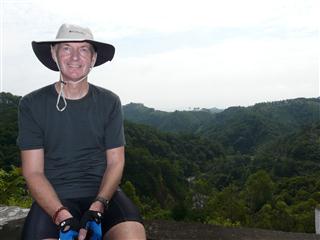
The only other traffic on the road were small motorbikes which are also
banned from the motorways in Guangxi. At the top of the hill we stopped
to take a photo and a convoy of small vans with two stroke engines
passed us, laden with bricks. As we set off again the convoy was parked
up as one of the engines had broken down.
The road continued through the hills, climbing and descending
repeatedly. This was the first serious hill climbing we had done since
entering Guangxi and infact since we had left Malaysia over four months
ago, so it was hard work. We also discovered that Steve hadn't 'toed-in'
the new brake blocks enough, so every time we put on our brakes they
squealed terribly. At lunchtime we stopped at a small cafe in Lingjiang.
Asking for chicken in the local Guangxi style. They produced a whole
steamed chicken, chopped up into bits with sharp bones.
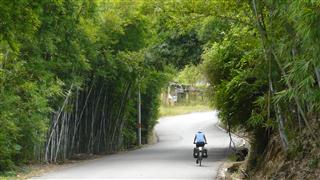
In the afternoon we pressed on along the quiet scenic road. At about 55km it started to climb again right up to about 420m. What with the heat and the aching legs it seemed like the roof of the World. As we descended into the next valley our nasal senses were struck by the pungent smell of aniseed. All around the town of Gulong star anise were lay drying in the sun, occasionally being turned by the local workers.
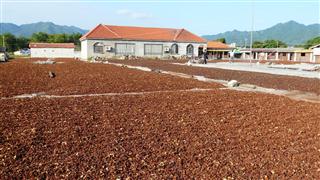
The Illicium Verum tree is grown extensively in Guangxi and the aniseed smell pervaded the whole town as we rode through. Everyone we passed was friendly and smiling and most of the young adults and children shouted "hello".
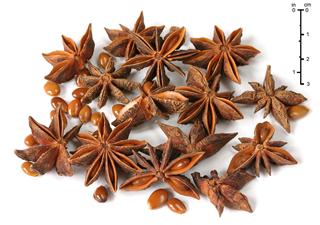
Another climb took us to the next valley, this time with water-melons as
its main crop. There were lorries laden with them heading to Wuzhou.
Taiping is a frantic, noisy, scruffy town with loads of half finished
buildings and piles of sand and gravel blocking the pavements. The
motorbikes, lorries, bikes and trucks don't seem to be bound by any
traffic rules but just seem to manage to avoid hitting each other. After
a long hard day of riding it was 6.30pm. It was getting dark and we
couldn't find a hotel. A woman directed us up a side road which was all
but blocked with lorries laden with watermelons. At the end there were
about six hotels, all lit with bright coloured flashing neon lights. We
booked into the most modern looking one and got a room with a mattress
that felt as though it was made of concrete and stank of cigarettes. But
it was modern and clean.
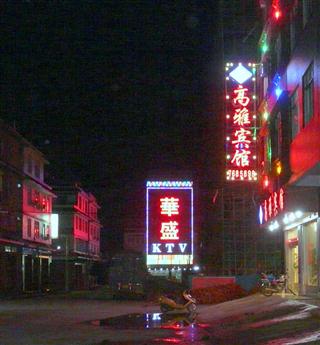
Later we walked back into the town for a meal and to try to buy some suntan lotion after forgetting to get some in Hong Kong, before we arrived in Guangxi. We showed the shop assistant the word in the phrase book and she produced a pot of moisturiser made from sheep's placenta!
Guangxi - Day 2 - Taipang to Mengshan
- Distance 82km
- Max Elevation 293m
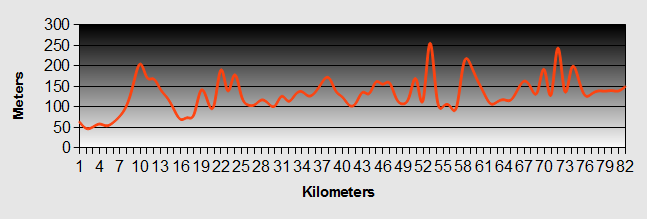
Guangxi - Taipang to Mengshan Ride Profile
Ride Description
With stiff legs and aching glutes we set off for another long ride to the next town that we were sure would have accommodation. Just out of town we saw our first "butcher's" shop, well more of stall really. He was selling real pieces of pork, like chops, not just the chewy bits. It was also a food place, so we ate breakfast there; noodles!
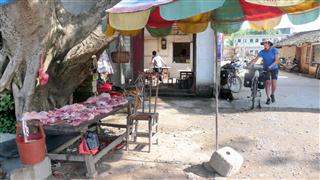
The road started to climb over the bluffs along the river. It was hot
and hard riding, with one punishing hill after another. We had to keep
popping peanuts and drinking copious amounts of water.
In one of the towns we met two Chinese touring cyclists about our age
who were traveling from Beijing to Bangkok, via Guangxi. They looked
very weather worn.
The road ran along the side of the river, which by now was slow flowing
but much cleaner with many barrages and small hydroelectric stations of
the Guangxi State Generating Company along the way and high pine covered
slopes at its sides.
There were lots of lorries carrying white stone, piled high into
pyramids so that it would be impossible to stack one more rock without
the whole lot spilling onto the road. Amazingly it seemed to stay in
place despite the twists and turns of the road. This overloading is
normal for all types of transport, lorries, motorbikes and people.
Motorbikes are loaded with huge wicker baskets, loads of six feet or
wider carried across the back. Women stagger down the road with huge
piles of firewood or baskets of produce, carried in the traditional way
in two baskets on a pole over their shoulders.
The other notable thing about Guangxi roads is the complete lack of road
kill. Could it be that anything killed on the road is put to good use
in the local cooking pots? So far in this area of Guangxi we have not
seen any historic buildings. Everything seems to have been built in the
last 30 years and is mostly plain utilitarian blocks with no soul. In
the Guangxi countryside there are a few farm buildings made of mud
bricks but these are rapidly crumbling, falling down and are being
replaced.
Menshang has a more easy going atmosphere than Taiping. It was slightly
tidier and had a more cosmopolitan feel. We found another good,
reasonably priced hotel with the same liberal promotion of safe
"relationships". We struggled to find a good restaurant and ate in a
roadside cafe. It was OK.
Guangxi - Day 3 -Mengshan to Moon Hill Village
- Distance 75km
- Max Elevation 392m

Guangxi - Mengshan to Moon Hill Village Ride Profile
Ride Description
Our bodies did not want to drag themselves out of bed today. Two months
of sedentary life style followed by only 6 days of cycling was taking
its toll. We both lay awake thinking we should get up earlier, but
didn't. On the way out we ate breakfast in Menshang. The ride today was a
lot flatter than the previous two days. There was quite a bit of gentle
down hill but it was much hotter. Even at 10-00am it was well into the
high twenties.
As we were approaching a main transport hub, the roads were getting busier again with many more heavy lorries.
Leaving Mengshang the road rose gradually over 8km to about 200m. It
was then downhill and onto the flat. Dropping down into the next valley
we were surrounded by spiky karst mountains which in the haze looked as
though they were in another world. The difference in terrain as we had
cycled through Guangxi was stark.
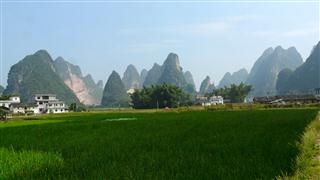
By lunchtime we were on the outskirts of Lipu (aka Licheng), the source
of the quarried stone that we had seen being transported. The town was
in the process of replacing its sewerage system so everywhere was more
chaotic than usual. After a quick lunch we pushed on to Moon Hill which
was mostly downhill.
Stopping to buy a drink in Maling, Tavish McChew wearing a tartan kilt,
mending shoes at the side of the road. The surrounding shop owners and
locals were hugely amused.
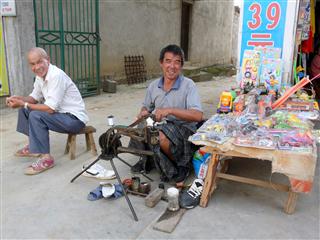
As we rode along we passed women making incense sticks, threshing soya beans and drying persimmons.
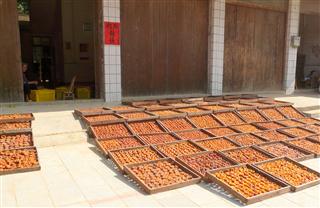
The Yangshou Village Inn at Moon Hill Village was recommended in Lonely Planet and the room rates quite a bit more expensive than we have been paying so far. But the relief of arriving somewhere where everyone, guests and staff, could speak English and had an Italian restaurant was immense. It is also a peaceful place (in contrast to Yangshou which we have been told is a backpacking party town) with fabulous views to Moon Hill, a karst hill with a large hole through its centre.
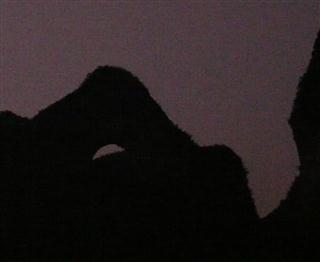
Guangxi - Moonhill - Day Off
The plan was to spend two nights here so that we could explore the
surrounding area of Guangxi on our bikes but overnight Karen got a nasty
dose of travellers diarrhoea so we had to book in for another night and
Karen spent the day in bed. It gave Steve a chance to catch up on the
blog and look for ways to access FB and blogger.
The following day was warm and dry and after having breakfast on the
patio we set off on our unloaded bikes to explore the Yulong River. The
helpful receptionist at the hotel gave us a free 'Tourist Map' but like
most tourist literature it was pretty useless. A few hundred meters
along the main road a shortcut took us along a narrow lane through a
couple of villages and to the lower bridge across the river. Lots of
bamboo rafts were coming downstream each carrying two passengers.
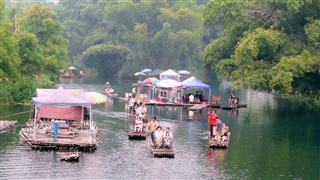
This old fella was happy wallowing in the river rather than crossing it.
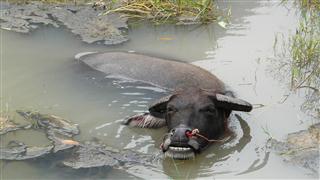
On the other side of the river we picked up the narrow but smooth concrete road which runs up the north side. Eventually this road ends at the river. The only option here is to either head downstream on a raft or get a raft ferry to the other side. We gave the little raft lady our 20 Y fare and she shouldered Karen's bike and nipped nimbly over about six other moored rafts to get to the outermost one. Steve was somewhat less agile as he tried to traverse the rocking and rolling rafts carrying his bike. Karen, with no load, fared even worse and was only rescued from certain dunking by the little lady who grabbed her and plonked her into the seat.
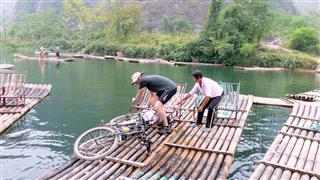
It only took about two punts of the bamboo pole to get the raft to the
other side and a slightly less taxing disembarking. The road on this
side was even quieter and took us through a couple of villages with a
combination of old traditional houses and many new ones in the process
of being built.
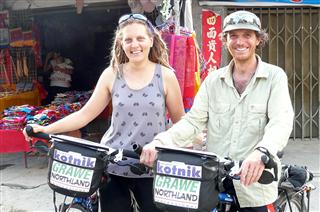
At the next bridge we went back over to the north bank and were
immediately pounced upon by a local lady on a bike. She attached herself
to us as our unofficial 'guide' with the intention of persuading us to
take a bamboo raft ride down the river. Despite our protestations that
we were not interested she doggedly pursued us. An attempt to unload her
onto another group of hapless tourists failed.As we reached Dragon
bridge, one of the most famous landmarks on the Yulong River, she was
still following us then.
On the road we met another couple of touring cyclists, Philipp and Valeska,
from Austria. There is a link to their web site on our Links page. They are hardened veterans of World cycle touring having
spent the last five years working a tour leaders in Norway during the
summer and traveling on their bikes during the winter. We spent the next
couple of hours cycling with them, hearing about their travels in
Africa, India and the Americas.
The Yulong Valley is an outstandingly beautiful area of Guangxi. It is a very popular destination for both foreign and Chinese tourists. It is saved from being completely ruined by promoting the concept of hiring bikes to cycle up the river and returning downstream on a raft. This means that the narrow lanes have little traffic on them other than bicycles and the vans which transport the bicycles back to base and the rafts, having no engines, gently and silently glide downstream.
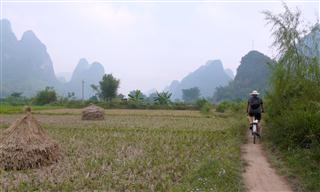
The still, reflective river Yulong meanders slowly along the flat valley floor through orchards, paddy fields and pastures surrounded by massive towering karst pinnacles. The high humidity gives a misty, slightly out of focus view which enhances the beauty.
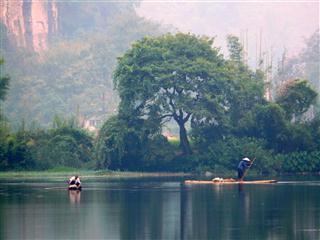
We rode back along the south side pf the valley along a narrow footpath
along paddy fields, a bit muddy and rough in places. The biggest threat
here were the large parties of young Chinese tourists riding hired bikes
and tandems who had little control of their vehicles on the rough
ground. We stopped to let them pass.
The plan for the next day was to cycle along the Li River to Yangshou
but overnight Steve fell foul of the bug and we had to stay at Moon hill
for yet another night so that he could have a day in bed.
Guangxi - Day 4 -Moon Hill Village to Yangshuo
- Distance 38km
- Max Elevation 239m

Guangxi - Moon Hill Village to Yangshuo Ride Profile
Ride Description
The morning dawned bright and sunny. Steve was still a bit jaded. Karen
decided that rather than just cycle 9km up the busy main road to
Yangshou we could go across country to the Li river valley and follow
that north to Yangshou. That would sort Steve out.
With only the previous day's "tourist map" to work from and the hotel
receptionist's warning of "they've built a new road" but not the
expertise of English to explain how this would affect us, we set off.
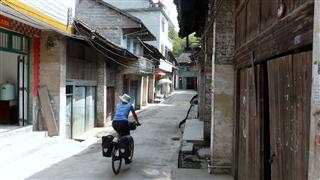
The first section was easy along a narrow unsurfaced lane through the
typical Yangshou countryside. We eventually came in sight of the new
motorway. There was a choice of either going under it through a small
underpass or forking left towards a little village. We took the left
fork and the next 5kms rode along a single width track through little
villages, around fields and orchards, weaving between the karst rocks
and crossing under the motorway a couple of times.
The path ended at a smooth concrete road which again took a circuitous
route through the fields and fish ponds, resulting in us loosing all
sense of direction. The sat nav didn't help much because here in Guangxi
there is quite a significant south west offset. At last there was a T
junction with a signpost (in Chinese of course) and by some miracle the
symbols matched those of the village we were trying to get to.
After a bit of a climb and a long downhill we arrived at Puyi, formally
an end of the road village on the banks of the River Li. No more though
because they have just replaced the bamboo raft ferry with a brand new
concrete bridge. The bridge is complete but the road has yet to be
surfaced, with huge mounds of gravel and sand and mud. As we watched, a
small three wheeled scooter type van drove over and tilted so alarmingly
from side to side that we were sure it would overturn. The stalwart
Guangxi driver knew what he was doing and arrived safely.
We rode through the old village on the narrow "main street" . There were
typical Guangxi shops and houses lining both sides with fold back
wooden doors at street level and small balconies above. As we rode past
we caught glimpses of life through the open doors. Small shops selling
essentials, families dining, three old ladies playing cards and a
carpenter working his wood.
On the river shore a family were mending their boat, using traditional methods and the woman had the job of sawing the wood planks.
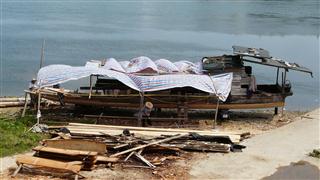
It wasn't easy to find our route out of the village and Steve announced
that there was no way he could ride back up the hill that we had just
descended as his legs were too shaky. Then Karen spotted a narrow
alleyway between two houses and an old lady in a field assured us we
were on the right road.
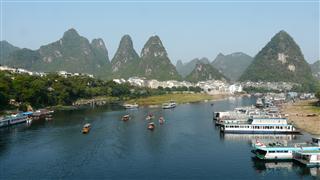
Again it was a rough unsurfaced farm track winding through the hills, passing little hamlets with happy smiling people, strutting cockerels, ducklings sleeping in the shade and even friendly dogs. In one village it seemed like the whole male population were working together constructing a house. They were all so busy, mixing cement, laying bricks, moving gravel but happily chatting and laughing and greeting us.
Navigation wasn't always easy and we took a couple of wrong turns in the villages. The lane now had a smooth concrete surface and there were a few tourists cycling on rented bikes so we knew we were on the right road. Steve was very pale by now but there was only one bit of hill and suddenly we were into the melee of Yangshou. Buses full of tourists, the river packed with boats, touts at every turn trying to sell bike hire, pictures and boat trips. On the river the "bamboo" rafts were instead made from lengths of blue water pipe. It was all a bit of a shock after our peaceful day.
We had decided to try the River View Hotel recommended in the Lonely Planet but the tiny town map of Yangshou was too confusing to make sense of and it took us a full circuit of town to work out where we needed to go. Once we found it we got a room with a huge balcony overlooking the river.
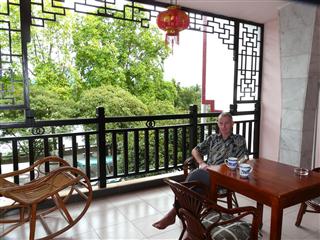
Sitting out on the balcony we noticed a man on a recumbent bicycle on the pavement opposite. Steve had recovered enough by now to go out to chat and have a go on the imaginatively modified bike, complete with wing mirrors, umbrellas, headlight and boom box sound system.
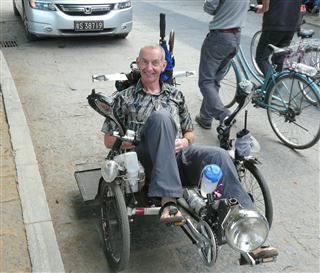
Guangxi - Day 5 -Yangshuo to Wangshuongong
- Distance 89km
- Max Elevation 575m
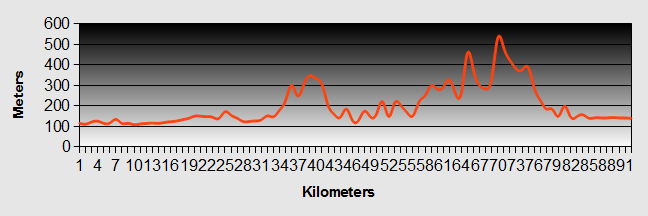
Guangxi - Yangshuo to Wangshuongong Ride Profile
Ride Description
This was a real agony and ecstasy day. We planned to go to Guilin, one of the bigger cities in Guangxi. On the main road it was 66km distant but we had heard from Phillipp and Valeska that it was unpleasantly busy. The Guangxi tourist map showed a road on the east side of the Li valley, going to Xingping. From there was a single line road, we assumed similar to the single line roads we had ridden yesterday, all the way to Guilin.
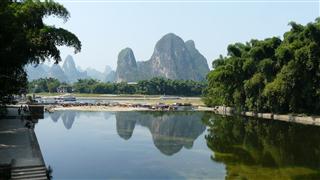
We left town on the busy S305 to Guanzhou, crossing the River Li on the
Yangshou bridge. The river was peaceful and calm before the day's rush
of tourists. At Fuli we turned onto a quieter road to Xingping. It was a
very hot day with a cloudless blue sky. The road was flat and we made
fast progress.It was Sunday and several locals passed us on motorbikes.
We imagined they were going out to lunch taking their food contributions
with them. One had a live chicken on the back and the passenger was
holding onto it to stop it escaping. Another had a dead animal wrapped
in a blanket. Judging from the legs sticking out it was a dog.
Xingping town lies on the banks of the River Li and in recent years has
become a real tourist hotspot. As we rode into the outskirts of town a
whole babel of Guangxi women started running down the road towards us,
all intent on getting the commission for selling us 'her' boat ticket.
It takes a long time to get the message across that we don't want a
ticket so they follow us down the road and more join them.
It seemed too early for lunch at 11.30 so we sat and had a cup of tea,
watching large crowds of young Chinese tourists obediently following
their tour guides who were carrying large pennant flags on long poles.
Avoiding the tour sales ladies we returned along the road to the turning
for Guilin. At Shu Jiabao there was a turning to the right signposted
to the "Lotus Flower Cave". Karen had read about this place in a guide
book and as it was only 2km we decided to take a look. Of course it
wasn't 2km, more like 4km and the signs firstly went to exclusively
Guangxi symbols, then no more signs.
Arriving in a village a lady pointed us down a track at the side of the
small river. There didn't seem to be anything down there so we returned
and asked another person. They pointed down a road into a scruffy yard.
It didn't look promising but then we noticed a little sign in English
over a closed window saying 'Ticket Office'. It was deserted but there
was a family in a house opposite. The man came out and said something we
couldn't understand. After thinking we would be able to get tickets he
eventually managed to get us to understand that the electricity was off
so the cave was closed.
Returning to the junction we took the Guiling road. It was a nightmare.
The roughest, dustiest road we have ridden on yet. The surface had great
lumps of rock protruding from it, the edges rubbed shiny by heavy
lorries, buses, trucks and motorbikes which left clouds of thick dust in
their wake. There were massive potholes and all the traffic vied with
each other for the least rocky part of the road. Watching the buses
approach at speed over the bumps for once we were glad to not be a
passenger on them.
After 8km we arrived at the village of Jiangcun. We sat in the shade
inside one of the little stores and as we drank our cokes a lot of the
locals came to peek through the door at the foreigners. There wasn't
much to eat, just a few factory made cakes and biscuits packed in
plastic. The helpful lady owner produced a pack containing a bread bun
with a sickly honey/coconut filling with some brown lumps which could
have been raisins. Too hot and hungry to care we ate them. The two lady
shop keepers sat on tiny stools knitting intricately patterned jumpers.
The road didn't improve and 2km later it began to climb into the
mountains.At least by now it was relatively quiet with only a few
motorbikes and locals leading their cattle. Steve was still feeling
unwell and had to take it slowly.
Halfway up this first hill we met another touring cyclists coming in the opposite direction. This was Chris Capener, from Aberdeen, who had been cycling RTW since February. See our Links page for his web site link
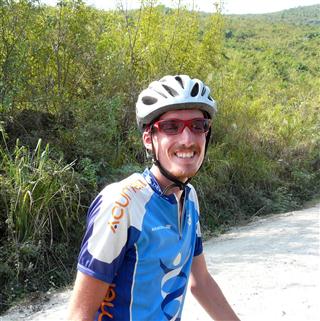
After a quick exchange of web addresses we continued up the hill, and the next one, and the next one...
There were some fabulous views over the karst from the tops but the
arduous surface and Steve's problems made it seem like torture. Worse
still we were fast running out of water. After about 25km we breasted
the last summit giving views, though a bit hazy, into the Li valley far
below us.
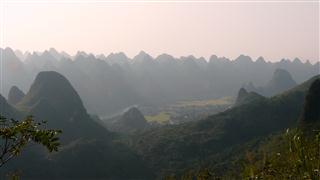
A long descent followed, we knew we'd climbed a long way.
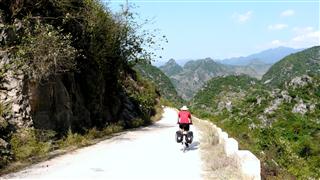
Halfway down we reached concrete road. At the bottom we managed to buy
water so quenched our thirst. It was 4.30pm and still 30km to Guilin.
Steve was finished so we decided to stop at the first accommodation we
could find. There was a huge resort complex right at the side of the
road. It looked expensive and exclusive with the car park full of buses
and cars and a huge, impressive water feature. We rode in and up to the
reception building. This was locked with a big padlock. The next door
along was similarly fastened. There was a security guy at the gate but
he tried to ignore us so we gave up and continued.
We found a rather seedy hotel in the next town and booked in. It was
only 60 Y so we could ignore the filthy walls and cockroaches. Down the
road from the hotel was an outside food stall where we had stir fried
noodles and vegetables, small beef skewers and barbecued sweetcorn which
with two bottles of local beer cost GBP3.
Guangxi - Day 6 -Wangshuongong to Guilin
- Distance 89km
- Max Elevation 575m

Guangxi - Wangshuongong to Guilin Ride Profile
Ride Description
Before going to bed we piled all the bags onto the other bed to keep the cockroaches out of them. It wasn't a good nights sleep as the mattress was so hard. The next day was hot for the ride into Guilin, a flat and easy one. We had dreams of a nice English breakfast with coffee in the city but after walking round for a while had to settle for a pizza instead. We got a room at the Starway Hotel Grand which has the most comfortable beds in Guangxi. To make sure that Steve was completely recovered we booked in for another night and spent the next day exploring Guilin.
Guangxi - Day Off - Guilin
Guilin is a vibrant, cosmopolitan city. The heavy traffic seems to be kept out of the main town and the avenues are wide and tree lined making it a light and leafy environment. We breakfasted at a nice little coffee bar serving a real American breakfast and then walked along the side of the river, where even in the middle of the city, fishermen were poling their boats along, casting their nets and one was even using a cormorant to fish, (just like the HSBC advert).
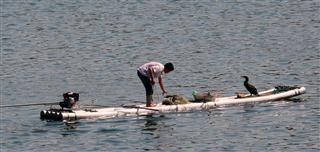
The whole city is built in and around the karst rocks and we had to climb one of them at least. A further walk along the river took us to the Bright Moon Hill. We dutifully paid our 35 yuan each, jostled with the hoards of Chinese tour groups and trudged our way up the, god knows how many steps, to reach the top, where we were treated to wonderful views across the town.
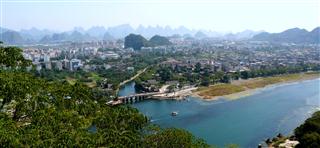
From here we could look across the Mulong Lake where we decided to head for next, but not before finding some lunch. Steve managed a bowl of noodles, he was definitely a lot better.
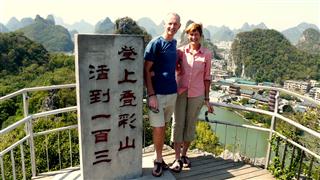
The area around the Lake has been preserved as an example of the old fisherman's village and includes what is left of the original city wall gates, but at 90 yuan each we passed.
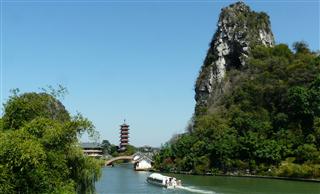
Instead, we headed across the road to view a number of street stalls selling the most beautiful Guangxi vases and pottery figures. If only we had a house to put them in...
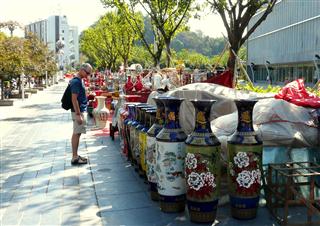
With tired legs and a yearning for that afternoon beer, it was time to head back to the hotel, shopping on the way to buy in supplies for a long hard ride into the mountains and rice terraces tomorrow. Oh and there was also time for a quick photo opportunity with Ronald...
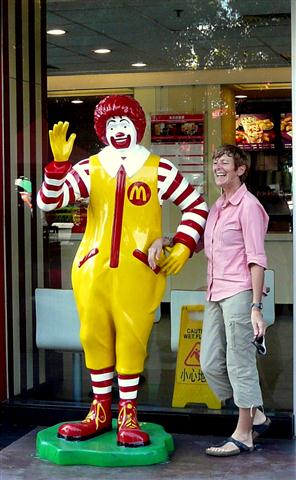
If you enjoyed our Guangxi page, why not have a look at some of our other Cycling China trips, such as:
Cycling in Guizhou
Or you can return to our
Home Page from Guangxi
New! Comments
Have your say about what you just read! Leave me a comment in the box below.